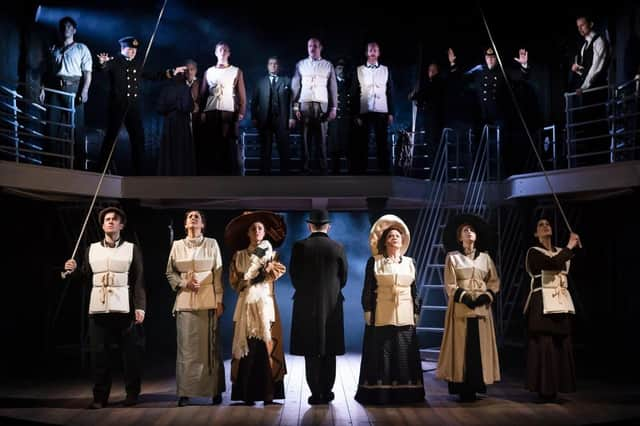Titanic The Musical set to have an emotional launch


In the final hour of April 14, 1912, the RMS Titanic, on her maiden voyage from Southampton to New York, collided with an iceberg and 'the unsinkable ship' slowly sank. More than 1,500 people lost their lives.
Based on real people, Maury Yeston and Peter Stone's stunning musical focuses on their hopes and aspirations, from the third class immigrants, to the millionaire barons of first class.Â
Advertisement
Hide AdAdvertisement
Hide AdThe original Broadway production won five Tony Awards, including Best Musical, Best Score and Best Book.
Matthew McKenna plays the dual roles of Third Officer Herbert Pitman and First Class Steward Henry Etches.
The Guide caught up with Matthew in the company's final week of rehearsals and found him upbeat ahead of the tour's start.Â
'We're just tying up loose ends and getting ready to go on the road, we start our journey in Southampton on Monday.
Advertisement
Hide AdAdvertisement
Hide Ad'We're all pretty confident to be honest, it's all just technical pieces, it's the last little touches. We've got a really good team and a safe company '“ everyone works well together.'
With Southampton occupying an important place in Titanic's story, how does he feel about starting there? 'I don't think we fully comprehend the depth of it yet. We're actually performing the week of the anniversary and we have a Saturday evening performance that coincides with the ship going down so when we finish, that will be the time that it went down, When you think about that, and that we're in the place that it left, it's quite emotional.
'It's already an emotional piece, you can already feel the moments that are going to get to us, but to then know that we have the added weight of being here'¦'
What's it been like portraying a real person, someone like Henry, who was actually from Southampton?
Advertisement
Hide AdAdvertisement
Hide Ad'When you see the story, it's such an interesting journey because he's quite happy to go: "Ok, this has happened now, but I'm going to get on with my work". It's not just seeing his track but everyone else at that moment who was still on the boat, the acceptance of what was going on, it's quite amazing.'And did he do any research into the people?
'I picked up a little bit, but I didn't want to do too much, it's still got to have an element of interpretation. With regards to his family life and his home life, I've tried to steer clear. Too much information might give you the wrong steer for what we're trying to do on stage. Most of the research I did was on the ship itself.
'We watched a couple of videos of a reenactment timeline of the ship going down, and it's fascinating, how slow it was and then the rapid drop at the very end. We focused on things like that, giving a sense of depth of the circumstances.'
Many people are now familiar with the story of that fateful voyage thanks to James Cameron's 1997 blockbuster, which was the highest grossing film of all time for 12 years, and cemented Leonardo Dicaprio's star status. But Matthew cautions that the musical is a very different beast.
Advertisement
Hide AdAdvertisement
Hide Ad'Most of the people that I know are aware of the background and that it's not the same story. If people do come to see the movie version of it and they feel slightly disappointed that it's not that story, I can promise you that their minds will be utterly changed.'
Given the special effects-heavy depiction of the sinking on film, how is that tackled in the show?
'Some of it is left to the imagination and there's a lot of it suggested, I wouldn't want to give any more away.
'The direction and the choreography during those final moments is very touching and very poignant, I can only say that it's better to watch it than have me describe it '“Â I wouldn't want to ruin it.
Advertisement
Hide AdAdvertisement
Hide Ad'This version is real, it's honest and it's just as beautiful, if not more so than the film.
'It will be quite exhausting, but I'm looking forward to getting on the road.'
Mayflower Theatre, Southampton
April 12-21
Â
Â